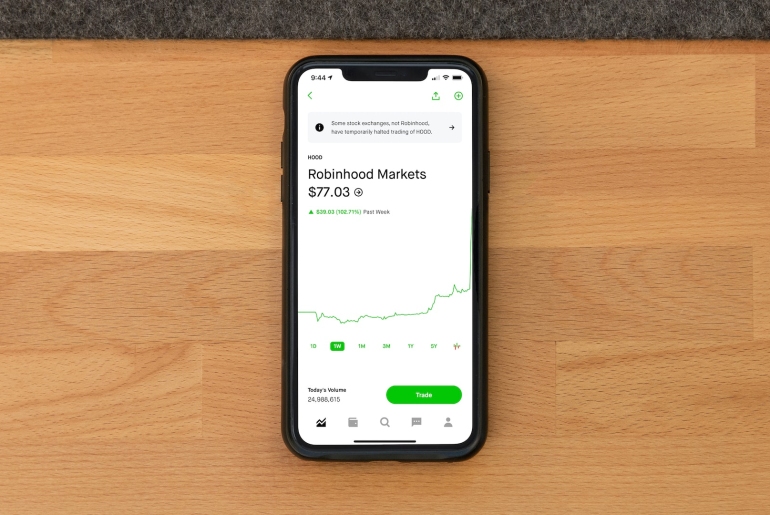This article may contain references to products or services from one or more of our advertisers or partners. We may receive compensation when you click on links to those products or services. Nonetheless, our opinions are our own.
The information presented in this article is accurate to the best of our knowledge at the time of publication. However, information is subject to change, and no guarantees are made about the continued accuracy or completeness of this content after its publication date.

Updated by Albert Fang
Investing in the stock market is a great way to build wealth and achieve financial goals. However, it can be overwhelming for beginners to navigate the various investment platforms available. Two popular investment apps are Acorns and Robinhood, but what are the differences between them? In this blog post, we will take an in-depth look at both platforms and compare their key features and services, investment process, account types, cost structures, safety measures, and which platform is easier for beginners. By the end of this post, you will have a better understanding of which platform suits your investment style and how to make an informed decision.
- Getting to Know Acorns and Robinhood
- Key Features and Services
- Understanding the Investment Process
- Comparing Account Types
- Evaluating the Cost
- Which platform is easier for beginners?
- Safety Measures in Acorns and Robinhood
- How to Decide Between Acorns and Robinhood?
- Conclusion
- Frequently Asked Questions
- Recommended Reads
Getting to Know Acorns and Robinhood
Acorns and Robinhood are well-known investment apps that cater to beginners looking to dip their toes into the world of investing. Acorns focuses on simplicity, offering features like round-ups and spare change investments to make it easy for users to invest their money. On the other hand, Robinhood provides commission-free trading of stocks, ETFs, and even cryptocurrencies, giving users a wide range of options to choose from.
These two platforms have their own unique offerings that make them stand out in the market. Acorns, for example, allows users to invest their spare change by rounding up their purchases to the nearest dollar. It also offers the option to set up recurring investments and even has a feature called Acorns Personal, which provides personalized investment advice.
Robinhood, on the other hand, is known for its user-friendly interface and the ability to trade stocks, ETFs, and cryptocurrencies all in one place. Users can easily buy and sell these assets with just a few taps on their smartphones, making it convenient for young investors who are always on the go.
In conclusion, both Acorns and Robinhood are great options for new investors looking to get started in the stock market. Acorns focuses on easy investing and offers features like round-ups and spare change investments, while Robinhood offers commission-free trading of various assets. Each platform has its own unique features that may appeal to different individuals based on their investment preferences.
Brief Overview of Acorns
Acorns is a robo-advisor that offers a unique approach to investing. It automatically invests your spare change by rounding up your purchases to the nearest dollar and investing the difference. This makes it an excellent choice for new investors who want a simple and automated way to start investing. Acorns also provides pre-built portfolios based on your risk tolerance, allowing you to invest in a diversified mix of assets such as stocks and mutual funds. However, it’s important to note that Acorns charges a small monthly fee for its services. Overall, Acorns is a great option for young investors who are looking to start building their financial accounts and dip their toes into the stock market.
Brief Overview of Robinhood
Robinhood is an investment app that caters to a wide range of investors, offering the opportunity to trade stocks, ETFs, and cryptocurrencies. With its commission-free trading model, Robinhood has become a popular choice for new investors looking to enter the stock market without incurring high fees. The user-friendly interface makes it easy for beginners to navigate and execute trades seamlessly. Additionally, Robinhood offers unique features like a debit card and checking account functionalities, providing users with convenient financial accounts all in one place. This combination of investment opportunities and additional financial services makes Robinhood a great option for young investors looking to grow their wealth.
Key Features and Services
Acorns focuses on helping users save and invest their money, while Robinhood provides access to a wide range of investment options. Both platforms offer mobile apps for easy access. Acorns’ key feature is its emphasis on saving and investing, with features like rounding up purchases to the nearest dollar and automatically investing the spare change. It also offers pre-built portfolios based on the user’s risk tolerance. On the other hand, Robinhood stands out for its extensive selection of investment options, including stocks, ETFs, cryptocurrencies, and even fractional shares. Its user-friendly interface and commission-free trading make it appealing to new investors. Both platforms provide convenient mobile apps that allow users to manage their financial accounts easily.
Unique Features of Acorns
Acorns distinguishes itself with several unique features that set it apart from other investment platforms. One such feature is “round-ups,” which automatically invests the spare change from everyday purchases. This innovative approach allows users to effortlessly grow their savings over time. Additionally, Acorns offers a “Found Money” program that rewards users with cash back when they shop with partner brands. This not only helps users save money but also encourages them to make smarter financial choices. Furthermore, Acorns provides a retirement account option, catering to long-term savings goals. By offering these distinct features, Acorns ensures that users have access to a comprehensive and user-friendly investment platform.
Unique Features of Robinhood
One of the unique features of Robinhood is the ability to purchase fractional shares of expensive stocks. This allows users to invest in high-value assets without having to buy a full share. Additionally, Robinhood offers a free stock to new users as an incentive to sign up, giving them a chance to start their investment journey with a bonus. Another notable feature is Robinhood Gold, a premium service that provides additional features for a monthly fee. By subscribing to Robinhood Gold, users gain access to benefits such as margin trading and extended trading hours. These unique features make Robinhood a compelling choice for investors looking for flexibility and added value.
Understanding the Investment Process
Acorns and Robinhood offer different approaches to the investment process. Acorns automatically invests your money into a diversified portfolio based on your risk tolerance. This means that you don’t need to manually choose individual stocks or investment options. On the other hand, Robinhood allows users to have full control over their investments. Users can manually choose and trade individual stocks or explore other investment options. Both platforms also provide educational resources to help users make informed investment decisions. These resources can be beneficial for new investors looking to learn more about the stock market and different ways to grow their wealth. So, whether you prefer a hands-off approach or want to have complete control over your investments, both Acorns and Robinhood have features that cater to your investment needs.
How Investments Work in Acorns
Acorns employs a unique investment strategy. Instead of investing in individual stocks, Acorns directs your money towards a diversified portfolio consisting of low-cost ETFs. This approach ensures that your investments are spread across different asset classes, reducing risk. With Acorns, you can simply set up your investment preferences and forget about it. The platform automatically rebalances your portfolio as needed, taking away the hassle of manual adjustments. Additionally, Acorns allows you to establish recurring investments, making it easier for you to save consistently over time. This “set it and forget it” approach combined with the option for recurring investments makes Acorns a convenient choice for new investors looking for a hands-off investment platform.
How Investments Work in Robinhood
Robinhood offers a range of investment options, including individual stocks, ETFs, and cryptocurrencies. With real-time market data and trading tools, users can make informed decisions about their investments. This platform also caters to more experienced investors by providing options trading. Whether you’re interested in the stock market, cryptocurrencies, or even mutual funds, Robinhood has you covered. Additionally, Robinhood’s user-friendly interface makes it easy for new investors to navigate and explore different ways to grow their wealth. Whether you’re starting with just a few dollars or have a substantial amount to invest, Robinhood is a great option due to its low fees and accessibility. So whether you’re looking to invest your spare change or make larger investments, Robinhood has the tools and resources to help you reach your financial goals.
Comparing Account Types
Acorns and Robinhood offer different account types to cater to the varying needs of investors. Acorns provides three account options: Invest, Later (IRA), and Spend (checking account with debit card). On the other hand, Robinhood offers a standard brokerage account with the option to upgrade to Robinhood Gold for additional features. Both platforms provide a range of financial goals and account types to choose from, giving investors flexibility in managing their investments. Whether you’re looking to invest in mutual funds, save spare change with the nearest dollar feature, or explore socially responsible investing, both Acorns and Robinhood offer diverse options. Each platform has its strengths, making it important to evaluate your personal preferences and investment goals when choosing between the two.
Account Types in Acorns
Acorns offers a variety of account types to cater to different investment needs. For personal investing, Acorns provides individual investment accounts, allowing users to invest in a diversified portfolio that aligns with their financial goals. For long-term savings, Acorns offers retirement accounts, such as IRAs, which can help users secure their future. Additionally, Acorns understands the importance of starting early, which is why they also provide custodial accounts for kids, encouraging young investors to learn and grow their wealth. Moreover, Acorns offers a checking account with debit card integration, making money management seamless and convenient. Lastly, Acorns caters to socially responsible investors by offering socially responsible investment portfolios, enabling users to align their investments with their values.
Account Types in Robinhood
Robinhood offers a range of account types to cater to different investor needs. For individual investors, Robinhood provides individual brokerage accounts that allow them to invest in stocks and other assets. In addition to this, Robinhood offers retirement accounts like IRAs, which are ideal for those looking for long-term savings options. Active traders who want to borrow funds can take advantage of Robinhood’s margin trading accounts. Parents can also open custodial accounts on Robinhood to invest on behalf of their children. Lastly, Robinhood offers cryptocurrency accounts, allowing users to trade digital currencies such as Bitcoin. With these diverse account types, Robinhood provides options for investors with various goals and preferences.
Evaluating the Cost
When evaluating the cost of investment platforms like Acorns and Robinhood, it’s important to consider their respective cost structures and fees. Take into account your investment goals and trading strategy to determine which option aligns best with your needs. Compare the fees charged by both platforms to find the most cost-effective choice. Additionally, look into the different account types offered by Acorns and Robinhood, as they may have varying associated costs. It’s also essential to be aware of any additional fees or charges imposed by these platforms, such as trading fees or monthly subscription fees. By evaluating the cost factors, you can make a well-informed decision for your investments.
Cost Structure of Acorns
Acorns offers a cost structure that is designed to be transparent and affordable for investors. The platform charges a small monthly fee, which varies based on the type of account you choose. Additionally, Acorns charges investment management fees as a percentage of your portfolio value. It’s important to consider the cost of Acorns’ round-ups feature, which automatically invests your spare change, as this can impact your overall expenses. Evaluating the impact of Acorns’ monthly fee on your investment returns is crucial to determine if it aligns with your financial goals. You should also calculate the potential costs of investing in different asset classes using Acorns to make informed decisions.
Cost Structure of Robinhood
When considering the cost structure of Robinhood, it’s important to note that the platform offers commission-free trading for stocks, ETFs, and cryptocurrencies. This can be a significant benefit for investors looking to minimize costs. However, it’s crucial to consider the impact of any trading fees that may be charged by Robinhood for options trading or other features. Additionally, evaluating the cost of using Robinhood Gold is essential. Robinhood Gold is a premium subscription service that offers additional benefits but comes with a monthly fee. Another aspect to compare is the cost of purchasing individual stocks or fractional shares through Robinhood. Lastly, it’s important to take into account any potential costs associated with transferring funds in and out of your Robinhood account.
Which platform is easier for beginners?
For beginners, Acorns offers a user-friendly interface and automated investment features. On the other hand, Robinhood provides an intuitive mobile app and educational resources for novice investors. Both platforms make it easy to set up an account and link your bank information. Acorns offers pre-built portfolios and automated rebalancing, while Robinhood offers a straightforward trading process and access to real-time market data.
Safety Measures in Acorns and Robinhood
When it comes to the safety measures in Acorns and Robinhood, both platforms prioritize protecting your personal and financial information. Acorns employs bank-level security measures, ensuring that your data is secure. Meanwhile, Robinhood utilizes advanced encryption technologies to safeguard your account and transactions. To further evaluate the safety aspect, you should consider Acorns’ FDIC insurance coverage for its checking account and cash balance protection. On the other hand, Robinhood offers SIPC protection for brokerage accounts in case of broker failure. Additionally, both platforms provide authentication methods to secure your account access. By prioritizing security, Acorns and Robinhood aim to provide a safe investing environment for their users.
How to Decide Between Acorns and Robinhood?
Considering your investment goals, risk tolerance, and preferences, determining whether to choose Acorns or Robinhood becomes easier. Evaluate the range of investment options, account types, features, and cost structures offered by both platforms. Additionally, take into account the user experience and customer service to make an informed decision.
Conclusion
To summarize, both Acorns and Robinhood offer unique features and services that cater to different investment preferences. Acorns provides a seamless way to invest spare change and automate savings, making it beginner-friendly. On the other hand, Robinhood offers commission-free trading and a user-friendly interface, making it suitable for those interested in active trading. When deciding between the two platforms, consider your investment goals, risk tolerance, and desired level of involvement. It’s also essential to evaluate the cost structure and safety measures of each platform. Ultimately, choosing the right platform depends on your individual needs and preferences. So, take the time to research and compare both options before making an informed decision.
Frequently Asked Questions
What are the key differences between Acorns and Robinhood?
Acorns and Robinhood differ in their approach to investing. Acorns focuses on automated investing, rounding up your purchases to invest spare change. Robinhood is a commission-free trading platform for stocks, ETFs, options, and cryptocurrencies. Acorns offers pre-built portfolios based on risk tolerance, while Robinhood allows you to choose your own investments. Acorns charges a monthly fee, whereas Robinhood has no trading fees.
Which platform is better suited for long-term investing?
Considering long-term investing, both Acorns and Robinhood have features that can be beneficial. Acorns offers automated investing and savings plans for consistent long-term investment. On the other hand, Robinhood provides commission-free trading and access to a wide range of stocks and ETFs for building a diversified portfolio over time. Ultimately, the choice depends on personal preferences and investment goals.
Can I use both Acorns and Robinhood simultaneously?
Yes, it is possible to use both Acorns and Robinhood simultaneously. Acorns focuses on micro-investing by rounding up your spare change, while Robinhood offers commission-free trading for stocks, ETFs, and options. Utilizing both platforms can help diversify your investment portfolio. However, it’s crucial to conduct thorough research and seek advice from a financial advisor before investing in any platform.
Are there any fees associated with using either platform?
Both Acorns and Robinhood have fees for using their platforms. Acorns charges a monthly fee ranging from $1 to $5 based on the level of service. Meanwhile, Robinhood has no commission fees for trades but does have other fees for additional services like margin trading or wire transfers. It’s important to understand each platform’s fee structure before using them.

Reviewed and edited by Albert Fang.
See a typo or want to suggest an edit/revision to the content? Use the contact us form to provide feedback.
At FangWallet, we value editorial integrity and open collaboration in curating quality content for readers to enjoy. Much appreciated for the assist.
Did you like our article and find it insightful? We encourage sharing the article link with family and friends to benefit as well - better yet, sharing on social media. Thank you for the support! 🍉
Article Title: Acorns vs Robinhood: Understanding the Differences
https://fangwallet.com/2023/08/26/acorns-vs-robinhood-understanding-the-differences/The FangWallet Promise
FangWallet is an editorially independent resource - founded on breaking down challenging financial concepts for anyone to understand since 2014. While we adhere to editorial integrity, note that this post may contain references to products from our partners.
The FangWallet promise is always to have your best interest in mind and be transparent and honest about the financial picture.
Become an Insider

Subscribe to get a free daily budget planner printable to help get your money on track!
Make passive money the right way. No spam.
Editorial Disclaimer: The editorial content on this page is not provided by any of the companies mentioned. The opinions expressed here are the author's alone.
The content of this website is for informational purposes only and does not represent investment advice, or an offer or solicitation to buy or sell any security, investment, or product. Investors are encouraged to do their own due diligence, and, if necessary, consult professional advising before making any investment decisions. Investing involves a high degree of risk, and financial losses may occur including the potential loss of principal.
Source Citation References:
+ Inspo
There are no additional citations or references to note for this article at this time.












































